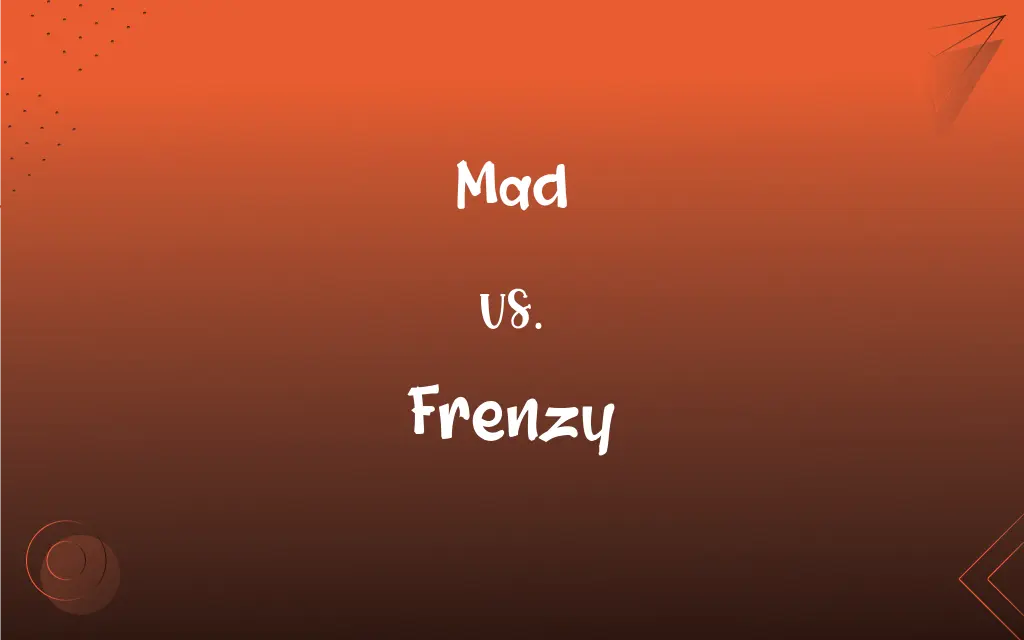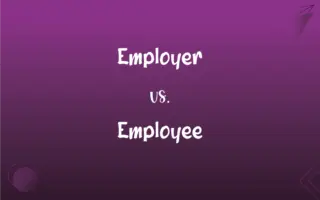Mad vs. Frenzy: What's the Difference?
Edited by Aimie Carlson || By Harlon Moss || Updated on November 8, 2023
Mad refers to being mentally ill or extremely foolish, while frenzy describes a state of wild or uncontrolled activity.

Key Differences
Mad can describe a state of mental illness, an extreme degree of foolishness, or a state of being very angry. It suggests a departure from the norm in behavior or belief. Frenzy, however, is a burst of wild, uncontrolled activity or emotion, often short-lived and intense.
Mad encompasses a range of emotions from anger to insanity, often implying a loss of self-control. In contrast, frenzy specifically denotes a temporary and intense burst of activity or emotion, generally driven by excitement or panic.
Mad can be used to describe an individual’s mental state or actions that defy logic or reason. It can be an enduring trait or a momentary lapse. Frenzy, in contrast, describes a collective rush of activity or emotion, often seen in groups and usually of short duration.
In common usage, mad might refer to a passionate obsession with something, but it retains a connotation of irrationality. Frenzy is used to describe situations where energy and activity reach a peak, often leading to chaos or disorder.
Mad can be used both as an adjective and a noun, as in 'madness'. Frenzy is typically used as a noun, but it can also be an adjective in its form 'frenzied'. Both can be used metaphorically but retain distinct meanings.
ADVERTISEMENT
Comparison Chart
Definition
Having a mental illness or being very foolish or angry.
A state of wild or uncontrolled excitement or activity.
Usage Type
Adjective, Noun (madness)
Noun, Adjective (frenzied)
Duration
Can be long-term (insanity) or momentary (anger).
Usually short-term, intense bursts.
Connotation
Negative, suggests irrationality.
Chaotic, often negative but can be positive (e.g., excitement).
Common Contexts
Describes people or their actions.
Describes situations or collective behaviors.
ADVERTISEMENT
Mad and Frenzy Definitions
Mad
Very angry.
She was mad at the news of the betrayal.
Frenzy
Wildly excited or enthusiastic.
Fans were in a frenzy as the championship game went into overtime.
Mad
Mentally ill or insane.
He was declared mad by the court.
Frenzy
A state or period of uncontrolled excitement or wild behavior.
The crowd was in a frenzy when the concert tickets went on sale.
Mad
Characterized by wild behavior.
The full moon made the dogs act mad.
Frenzy
Violent mental agitation.
The accusations threw her into a frenzy.
Mad
Extremely enthusiastic about something.
He's mad about vintage cars.
Frenzy
A fit or spell of frantic, rash, or uncontrolled activity.
He cleaned the house in a cleaning frenzy.
Mad
Extremely foolish or unwise.
It was a mad idea to go swimming during the storm.
Frenzy
A furious, urgent, or desperate striving.
There was a frenzy of activity in the office at year-end.
Mad
Angry; resentful
Was mad about the broken vase.
Frenzy
A state of violent mental agitation or wild excitement.
Mad
Mentally deranged
"afflicted with hypochondria, depression, and fear of going mad" (Carla Cantor).
Frenzy
Temporary madness or delirium.
FAQs
Is frenzy always negative?
Not always, it can be from excitement or enthusiasm.
Can mad be a permanent condition?
Yes, in the context of mental illness, it can be.
Can animals be described as mad?
Yes, particularly when they behave irrationally or dangerously.
Does frenzy imply group behavior?
Often, but individuals can also experience a frenzy.
Is 'mad' used to describe mental health professionally?
No, it's considered outdated and insensitive in professional contexts.
Is 'mad' an abbreviation for something?
No, it's not an abbreviation.
Does frenzy require physical movement?
Not necessarily, it can refer to mental states as well.
Can 'mad' mean extremely good?
Informally, yes, as in 'that's mad skills'.
Does 'mad' relate to anger in all English dialects?
Mostly, but some dialects use it primarily for 'crazy'.
Can someone be 'mad' in a positive sense?
Yes, as in being 'mad about' a hobby or interest.
Is a frenzy always loud or visible?
Typically yes, but it can be internalized as intense feelings.
Do businesses use the concept of frenzy in marketing?
Yes, often to describe eager consumer behavior during sales.
Can the term 'mad' be used legally?
It's not commonly used in legal definitions.
Can inanimate objects be in a frenzy?
Metaphorically, yes, like 'the sea was in a frenzy'.
Can frenzy be a positive aspect of a sports game?
Yes, it can describe the exciting climax of a game.
Can frenzy be controlled?
It's difficult as frenzy by nature is uncontrolled, but it can be managed.
Can one be 'mad at' an inanimate object?
Yes, although it's understood this is a figurative expression.
Is frenzy ever used in a medical context?
Rarely, unless describing a psychological state.
Can 'mad' mean passionate in British English?
Yes, it can mean very keen or enthusiastic.
Does frenzy have a historical or literary origin?
Yes, it has been used in literature to describe intense emotion or activity.
About Author
Written by
Harlon MossHarlon is a seasoned quality moderator and accomplished content writer for Difference Wiki. An alumnus of the prestigious University of California, he earned his degree in Computer Science. Leveraging his academic background, Harlon brings a meticulous and informed perspective to his work, ensuring content accuracy and excellence.
Edited by
Aimie CarlsonAimie Carlson, holding a master's degree in English literature, is a fervent English language enthusiast. She lends her writing talents to Difference Wiki, a prominent website that specializes in comparisons, offering readers insightful analyses that both captivate and inform.































































